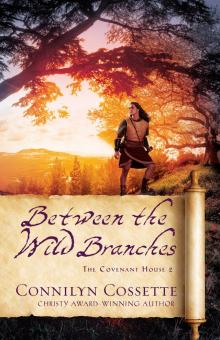- Home
- Connilyn Cossette
To Dwell among Cedars Page 14
To Dwell among Cedars Read online
Page 14
I held in a sigh of disappointment. Perhaps I had been wasting my time with her after all. Machlon had already moved down the street and was talking with a spice trader. I should catch up with him, or at least find someone else to coax information from besides an old woman who had not been atop the mountain in decades.
“And of course,” she continued, oblivious to my frustration, “when Abinidab and his family moved up there, they knocked it all down anyhow, burned the idols and cleansed the place. To think that instead of all those pagan gods, the Ark presides over this mountain now. What a blessing that has been.”
“How so?” I asked distractedly, my gaze on the crowd as I wondered who I might approach next.
“Ever since the sacred vessel arrived, the house of Abinidab has been mightily blessed,” she said, with an almost reverent tone. “And that did not change with his death. Even though Yoela went for many years without a babe, all of a sudden her womb seemed to blossom. She birthed four more little ones—two of them twins! She may even be increasing again, if I’m not mistaken, and I’m rarely wrong on these sorts of things.” The woman beamed as if it were her own daughter giving birth to so many.
“And the gardens—” She paused to place a gnarled hand on her heart. “Oh, you’ve never seen such extraordinary gardens, young man. The squash, the melons, every variety of vegetable and fruit and herb you ever could imagine grows in abundance up there. It is miraculous! There is so much they cannot use it all, so they share with us in town.”
The idea that the presence of the Ark had in some mystifying way contributed to the expansion of both Elazar’s brood and his prosperity amused me, but I squelched the smile that sprang to my lips. Perhaps if they could not provide me with the location of the Ark, they might at least inform me about the family that guarded it.
“Then Elazar is well respected in Kiryat-Yearim?” I asked.
“He is everything good and honorable,” she said with a firm nod. “Just as Abinidab was before he went to his forefathers. It is no surprise that Yahweh led the Ark here. There could be no better man to watch over it.”
“So Elazar’s family stays up on the mountain, sending food down to you like they are kings and queens?” I asked, remembering that my uncle regularly accused them of acting as self-appointed royalty.
“Of course not!” Bithya sounded personally affronted by my assumption. “There is not a week that goes by that his daughters do not come down with basketfuls of food to hand out door to door to those of us who are in no shape to hike up the mountain and pick for ourselves. Such sweet children. They seem to revel in sharing their bounty. Even the neighboring towns have benefited from their generosity.”
Her effusive praise had given me the perfect opportunity to slip in a question about the person I was most curious about. “And the Philistine girl they’ve adopted. What of her?”
“Eliora?” said Bithya. “Well now, when she and her brother first came to Kiryat-Yearim, we were all quite concerned, as you surely can understand, but by all accounts from those who’ve spent time in Elazar’s home, she is a sweet young woman who barely speaks above a whisper and is always ready to serve. But we’ve only seen her a time or two in all these years. She very rarely ventures down the mountain. It’s the other girls who deliver food to us. I wonder, now that two of them are married, if that will change—”
“The girl is not the problem,” said Atara, speaking over her sister and surprising me with her sudden engagement in our conversation. “She keeps to herself, never creates any trouble. But that brother of hers . . .” The woman bunched her mouth into a scowl. “We’ve had more items go missing—”
“Atara! There is no proof at all that young Natan has had a hand in such mischief,” said Bithya.
Her sister made a low noise in her throat. “And no proof that he has not. He’s a wild one, and not to be trusted.”
“He’s as bad as all that?” I asked, dismayed that Eliora’s concerns about her brother seemed to be founded on more than just avoiding familial responsibilities.
“Indeed,” said Atara, with a huff of indignation. “If he’s not instigating chaos, he’s fighting. And as I said, there have been more than a few instances of stolen goods since that boy appeared in Kiryat-Yearim.”
Bithya laid a hand on Atara’s arm. “Now, sister. It could be any one of the wayward boys who run around this area. We must not bear false witness.”
Atara frowned, unswayed by her sister’s gentle rebuff. “Those eyes . . . I don’t like the looks of them. It’s not natural.”
I’d forgotten that the boy I’d known as Lukio had two different colored eyes—which admittedly had been a small measure disconcerting at first—but I’d barely noticed them once he’d stopped glaring at me and gotten lost in the excitement of showing me how to play his dice game.
Bithya gave me a tilted smile, making it clear that the sisters had argued over all of this before. “Regardless of her brother’s troubles, her heritage, and the fact that she’s timid, Eliora is highly regarded in Kiryat-Yearim because it is she who tends those bounteous gardens up on the terraces. From what I hear, she is out there at first light every morning—weeding, watering, and who knows what else.”
“Is that so?” My pulse flickered as the ladies unwittingly stumbled right onto the path I’d hoped to lead them down.
“At times I wonder if her hands themselves aren’t blessed.” Bithya’s gaze drifted up the hillside, a bit of awe creeping into her tone. “Not only are the vegetables and fruit the largest and most flavorful you’ve ever had, but the flowers that young woman raises are beyond compare. Gan Eden could not have been lovelier.”
“Tell me,” I said, my warmest smile curving my lips. “If one desired to see these extraordinary gardens, how might he find them?”
Sixteen
Eliora
The rhythmic thwack of metal on wood drew me farther into the forest. It had not taken me long to find Natan once Gershom pointed me toward one of the smaller paths that snaked south of our home, saying he’d taken off just after dawn to cut up a fallen oak. The very one, I guessed, that he’d told me he was chopping up with his friends before he disappeared for more than three days.
“Tell him we need to depart soon or we won’t make it down to Kesalon before dark,” he’d said.
My father had determined that the best way for Natan to suffer the consequences of his actions was to have him rebuild the sheepfold he and his friends had partially destroyed and then help the shepherds with shearing the hundreds of sheep in the village of Kesalon.
To no one’s surprise, Adnan and Padi’s fathers were not interested in offering restitution for their sons’ actions, saying they were too busy supplying logs for some urgent large-scale building project. My father had returned from his meeting with them greatly dismayed at their lack of concern, both for their sons’ deviant behavior and for our relationship with our neighbors on the far side of the mountain.
I stepped into the clearing just as Natan swung the ax down on the fallen tree. Likely rotted at the core, it must have toppled during a recent storm, its top half sprawled across the ground like a fallen giant.
Unaware that I was watching, Natan again lifted the ax high above his head and let it drop with a grunt, sweat beading across his back and shoulders. It always surprised me when I saw him like this, engaged in tasks that required the strength of a grown man and wielding heavy tools like they were nothing more than the wooden swords he used to play with as a boy. In fact, if his curly golden-brown hair and broad-shouldered build were not so familiar, I might not even recognize him from this far away.
In my mind, he was still my little Lukio, the same boy who pleaded for me to carry him when his legs got too tired, who weaved his fingers into my hair as we slept snuggled together like kittens in a basket, and who placed his head on my shoulder as Azuvah told us her Hebrew stories. It seemed as though more and more traces of that little boy were fading away, swallowed up by the man he was g
rowing into. However, if he continued on the path he’d been traveling, I worried just what sort of man he might become.
“I brought you some food,” I called out before he could raise the ax again. He turned to watch me approach, leaning on the ax handle beside the surprisingly large stack of wood he’d accumulated in the past few hours. Wood shavings decorated his sodden curls and clung to the beard that was filling in more each day.
“You must be hungry. Gershom said you’ve been out here since dawn.”
He shrugged, wiping the sweat from his brow with the back of his hand, and I passed him the basket, which included a few fresh rounds of bread, some fruit and olives from my garden, and a skin of cool spring water. “Abba will be grateful for the extra wood since we used so much during the wedding.”
His expression darkened as he set aside the ax to accept my offerings. “He’s too busy punishing me for something that was not my fault to even notice.”
I lifted my brows, surprised that he’d brought up the altercation with the shepherds since he’d pointedly avoided discussing it with me the morning after the wedding. Settling myself on the intact portion of the fallen tree as he tipped the skin of water to his lips, I attempted to keep the accusation out of my tone as I responded. “You were there, Natan. How could it possibly not have been your fault?”
He scowled, speaking around the half-round of bread he’d stuffed in his mouth. “I already told you it wasn’t my idea to let the sheep free.”
“But you were still part of it. You were in the pen when the men came across you. Even I saw—and smelled—the filth on your tunic.”
His jaw ticked, but he made no move to contradict me.
“Why do you insist on being friends with Adnan and Padi? They seem to do nothing but get you into trouble.”
His eyes flared, a sneer on his lips. “Who else would I be friends with?”
I blinked at him in confusion. “There are plenty of young men down in Kiryat-Yearim near your age.”
“Who want nothing to do with me,” he mumbled as he bit into one of the red pears I’d harvested a week ago. The sweet smell made my own mouth water, so I reached into the basket and took one for myself.
“That’s not true. Medad and his brothers were once your friends.”
He scoffed, tossing the pear core into the brush. “Not anymore.”
“Why not?” I pressed. “When you were younger, the four of you got along so well.”
His lips pressed into a white line, and he would not meet my eye. “Leave it alone, Risi.”
Natan still refused to use my new name, instead clinging to the nickname he’d given me when he was barely old enough to talk. Although at times it annoyed me since I wanted to leave Arisa far in my past, there was affection within the word, and I cherished any precious tendril between us. But his refusal to reveal whatever had passed between himself and the boys in Kiryat-Yearim disconcerted me.
However, my brother was anything but free with his thoughts these days, and I knew pushing him would only lead to more walls between us. I could only pray that someday soon he would lay down his defenses and share with me the way he used to.
Therefore, I went quiet, allowing him time to eat in peace and absorbing the vibrant hush of the forest around us, broken only by layers of birdsong and the chatter of tiny creatures in the brush.
Once the food basket was empty, Natan went back to his task at the far end of the log I was perched on, hefting the huge ax over his head. I felt the vibration of each strike and marveled at how far the chips of wood flew with every blow. When one of them landed in my lap, I stood and retreated a few paces to avoid being struck.
“Where did you get that ax?” I asked when he paused for a breath. The tool was larger than any I’d seen before, the iron head double-sided and glinting in the sunlight, reminding me briefly of the enormous man we’d seen march through Ekron so long ago.
“Adnan,” he replied on a grunt.
“Why would he give you that? Doesn’t he need it for his work logging the hills?”
“His family had an extra one, so he offered it to me.”
I frowned, wondering why Adnan would share such a valuable asset with Natan. Iron itself was scarce among the tribes, since the Philistines had a stranglehold on the trade, and by the looks of the well-honed edges, the ax had been crafted by a master.
There was so much I didn’t know about my brother anymore. When had he stopped viewing me as his confidant? Even when he’d run around with the boys in Ashdod, doing things I wasn’t happy about, he’d always told me everything. Now he was secretive. Taking himself off into the woods whenever he could. Keeping even his joys to himself and rarely smiling anymore. He’d pulled so far away I feared at times that I would never get him back.
“Why would you go off with them like that during the wedding? I was so worried,” I admitted. “I could not concentrate on my duties while you were gone.”
“I knew it wouldn’t take long for you to come after me,” he said, huffing a sigh and then letting the ax fall again.
“Can you blame me? You were gone for three days! And all you’d told me was that you were going to cut up a tree. You could have been hurt, or worse, and none of us would have even known where to begin looking for you.”
“I’ve heard all this from Gershom. I don’t need it from you.”
That constricted feeling in the center of my chest coiled even tighter. “Why do you insist on spending time with people who care little for you?”
“How do you know that?” he snapped. “You know nothing about my friends, or what they care for. Would someone who does not care about me give me such an expensive gift?” He lifted the ax in one hand, shaking it to prove his point. “And they are eager to help me learn their trade.”
“Why?”
“What else do I have to do?” He threw his hands wide.
“Gershom and Iyov—”
“Are Levites. I am not,” he stated, his narrowed gaze daring me to disagree. But he was right. No matter that Elazar’s family had adopted us, nothing could ever make Natan a descendant of the sacred order of men dedicated to Yahweh’s service.
“But they still have plenty to teach you, if you would just—”
“The only thing they are interested in telling me is what I do wrong and how disappointed they are. They want nothing to do with me.”
“That’s not true. They were both very worried when they heard you hadn’t returned. They spent the entire day combing the forest and questioning everyone in Kiryat-Yearim. It wasn’t until someone said you’d been seen down in the valley with those Gibeonite boys that they gave up the search, since you could have gone anywhere by then.”
He blinked at me, seemingly taken aback by such a revelation. Then his lips flattened and he looked off into the trees, his jaw working as he thumbed the edge of the ax.
“If it had been you, they’d not have stopped looking,” he said beneath his breath. “But then, I’m not nearly as perfect as you, Eliora.”
The sardonic lilt of his tone stung, as did the pointed emphasis on my new name. “You are just as much a part of this family as I am,” I said. “If you would only allow them to show you.”
He shook his head, his brow wrinkled with mock sympathy. “You aren’t Hebrew, Risi. And you never will be.”
The blow hit me square in the chest, knocking the breath from my lungs. At the same moment, Gershom stepped into the clearing, a stern look on his face that made me think he’d heard more than enough of our conversation.
“Natan,” he snapped. “We must depart. Now. I sent Eliora for you a long while ago. What is keeping you here?”
“Nothing.” My brother gazed at me with an odd expression. “I’m ready to go.” Then he slung the ax over his shoulder and followed Gershom back up the narrow path, not sparing me another glance as he walked away.
Seventeen
Ronen
Months ago, messages had been sent to each of the tribes, calling f
or Levitical musicians and singers to join together as one for the first time since Shiloh had been laid low and celebrate the fall festivals. Although no one had been certain how many of the Levites scattered over the tribal territories would answer that summons, more sons of Levi had arrived in Kiryat-Yearim over the past few days, doubling the size of our camp and adding to the chaos. I did not envy Tuviyah, who had the enormous task of leading and organizing such a disparate group of men.
There were less than three weeks now to finalize the order of service for Yom Teruah—designated as the feast of shouting and trumpet blasts—and then only ten days past that to prepare for Yom Kippur, the day of fasting, repentance, and atonement. Sukkot, the Feast of Booths, would be the final convocation before the people tore down their sukkahs and dispersed back to their homes all over Israelite territory.
Although, if everything went according to plan, I would be leaving with the Ark the night after Yom Teruah, while the people were caught up in feasting and dancing after the sacred day of rest. What happened afterward made no difference to me. Abiram and his allies had called for the festivals to be held at Kiryat-Yearim solely for the purpose of retrieving the Ark.
“As you can see,” said Tuviyah to the group of us gathered on a high ridge, his resonant voice echoing off the rocky outcropping above us, “this place will be the perfect area for the musicians and singers to be arranged.” He waved a hand toward the valley below, where the people of Israel would soon gather. “They’ll be able to hear quite clearly down there.”
Surveying the way the hills curved to protect the area, I agreed. If worshipers gathered below this ridge, the sound of instruments and voices would reverberate across the expanse unobstructed. They should be able to hear even the smallest note with relative ease.
A far more difficult task would be to ensure that the musicians melded their various talents and instruments together in some semblance of order. As it was, the differences between our various traditions had already become such a source of tension in the camp that I wondered how Tuviyah would accomplish anything. He was a skilled leader, to be sure, but he was no Mosheh. Bringing together a group of men who had lately been acting more like squabbling children during practice sessions than consecrated musicians would more than likely require a miracle.

 Until the Mountains Fall
Until the Mountains Fall Between the Wild Branches
Between the Wild Branches To Dwell among Cedars
To Dwell among Cedars Counted With the Stars
Counted With the Stars Shelter of the Most High
Shelter of the Most High Shadow of the Storm
Shadow of the Storm A Light on the Hill
A Light on the Hill Wings of the Wind
Wings of the Wind